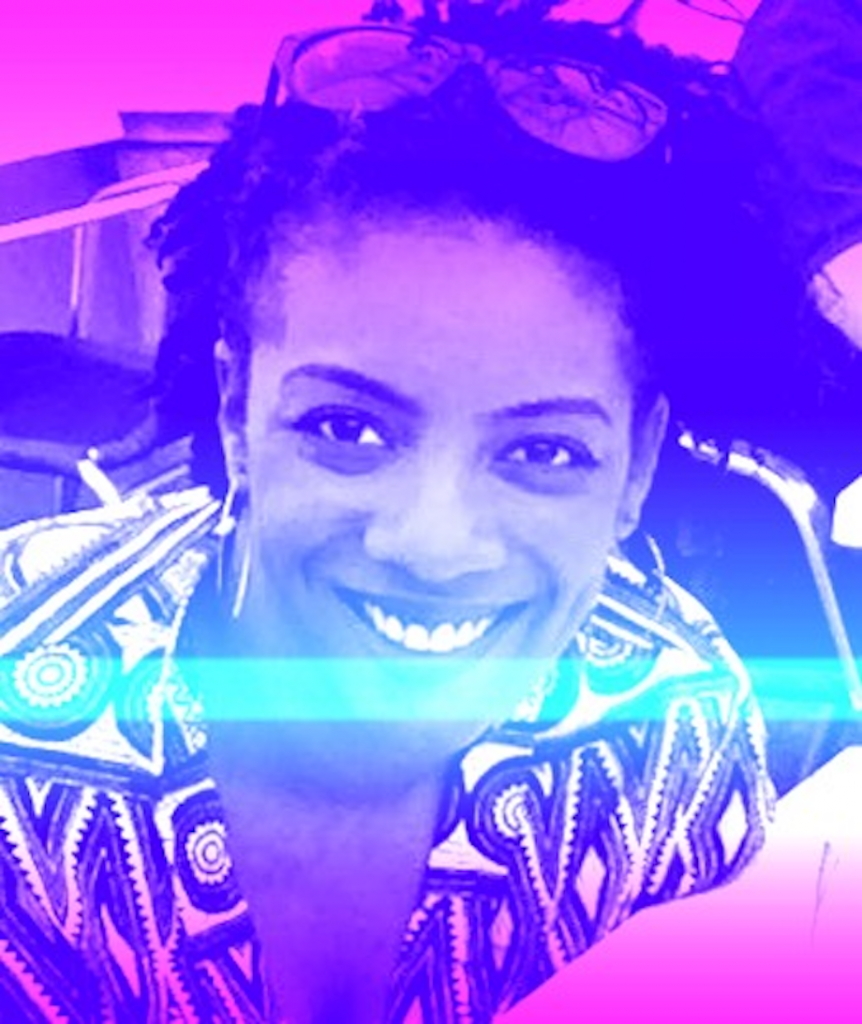Hayley
I’m Hayley Ramsay-Jones, the Director of the Geneva Office at Soka Gakkai International Office for UN Affairs. We mainly work on human rights education, climate justice and disarmament. Within our disarmament work we take a race-sensitive, intersectional approach – this often involves highlighting the disproportionate impacts that weapon systems have on marginalised and vulnerable groups. As well as raising awareness about how our own organisations and movements can be oppressive, reinforcing and perpetuating inequalities.
In my personal life I’d describe myself as being a spiritual, foodie, lover of cake; and my favourite pastime is watching home improvement shows, daydreaming about building my own home, ideally somewhere warm and near the sea!

Targeted advertising, bank loan approvals, predictive policing… autonomy in weapons, automation is increasingly becoming part of our lives. What types of digital dehumanisation are you most worried about and why?
All of it, definitely all of it! The real issue is our tendency to “dehumanise” others, this is something we all need to really grapple with. As long as we continue to believe that some groups are not as “worthy” as others, these problematic uses of technology are just going to keep popping up.
I recently had to use the health service, and I’ve become really concerned about the lack of regulation and interrogation of AI in our healthcare systems. The life-saving potential of these new technologies are immense, but research is emerging about whose lives are being saved and whose lives are falling victim to bias in AI. We are learning that if you’re a minority, typically black, poor or both, an algorithm can restrict your chances of receiving the care that you need. People who are sick are already in a vulnerable position, but to then be discriminated against by a computer algorithm in an institution that’s sole purpose is to help you, I think is really disturbing.
Tell us about a time when you saw or experienced discrimination, risk, or oppression resulting from the use of a technology, program, or algorithm.
For me the scary thing is that because of the lack of transparency behind how algorithms function, it’s so difficult especially as an individual to even know, yet alone address, when you or someone else is being discriminated against.
Add to this the speed and scale in which technology can perpetuate this discrimination with virtually no recourse or accountability.
I don’t know the figures of how many lives are affected in very detrimental ways due to bias in technology but judging by the amount of research emerging on this the numbers are worryingly high.
But in terms of what you might call “technological microaggressions”, I can say that every time I use an automated soap dispenser, hand dryer, a facial recognition system or I’m simply in a group photograph, as a dark-skinned person I always wonder… will I be seen.
The 2020’s have been a little rough so far. What gives you hope?
I can’t think of another year (in my lifetime) that embodied both grief and hope so profoundly as 2020. Covid was such a shock, so many people lost their lives, livelihoods, physical and mental wellbeing. Within all of that we witnessed people reaching out to do their neighbours food shop and deliver needed medicines. These local acts of humanity were inspiring and contagious. Seeing them, especially in some of our individualistic societies, definitely gives me hope.
2020 also saw the brutal murder of George Floyd and a global response to anti-black racism. Like many people my heart went out to Floyd’s family and all the other families who’ve lost loved ones to systemic racism. But I also grieved the fact that we still have to profess “black lives matter”; it really depresses me.
But again, I think there’s hope in that so many people did say it, and although there’s a lot of performativity I do think more people are recognising their own racism and are actively trying to address it.
In my personal life 2020 was also extremely fear inducing and joyful. After a lot of heartache, sacrifice and loss, in March 2020 I found out I was pregnant, later in the year I got married and then gave birth to a very healthy, totally adorable, ball of gorgeousness (if I do say so myself).
It was a scary time to be pregnant because we were isolated and far from family and no one knew how Covid affected pregnant women. It was also a very challenging pregnancy including serious complications at the birth. But by the end of the year, I was alive, healthy, still had a supportive workplace, a wonderful wife and a very new and amazing baby.
So all in all what 2020 taught me about hope is that it’s a lifeline.
Why are you part of the Stop Killer Robots movement?
I think it’s really important to get involved and to try to create the world you want, not only in your personal life but also in your community and society at large. To me being involved in wider social issues no matter what they are is empowering, it’s saying that my voice, my ideas, and feelings matter. The way the world is structured right now we’re often led to believe that we don’t have any power or say in how this world is shaped. That’s a really powerful message because when we internalise it, it leads to apathy which maintains the status quo.
Machines that get to decide who lives and who dies haven’t been normalised yet, so we, humans who are alive right now, get to decide if this is the course that humanity should go down. But it’s urgent, these weapons are being developed now. So if we want to create something different for our world we also have to act now.


